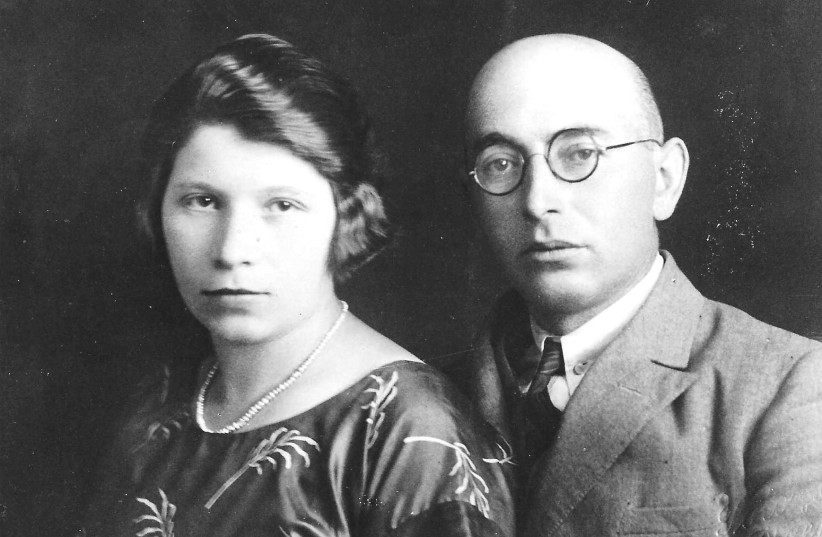She was an adult in the 1990s when author Anna Salton Eisen told her father she wanted to learn about his family, most of whom had been murdered by the Nazis.
His rejection of her request was absolute and profound.
“I am Adam,” he told her. “Nothing came before me. Everything and everyone is gone and it all starts over with me.”
If coping with Holocaust fallout was not enough, Anna is also the founder and first president of Congregation Beth Israel in Colleyville, Texas, where the horrific hostage situation occurred in January 2022.
She has been interviewed in every major media outlet including CNN, The New York Times and The Washington Post about her experience, the strength and unity of her community and coping with trauma (she is a therapist specializing in mental health and trauma).

Salton Eisen brings all of these different experiences to bear in her book about being the child of Holocaust survivors.
Bringing experiences to bear
I’ve often read that survivors were reluctant to talk about their personal Holocaust nightmares with their children. But I didn’t really understand the passion of their silence – and the steps they were willing to take to keep their children in the dark – until I read this moving account of such a family.
The book is divided into two parts: the author’s childhood when there was no discussion of her parents’ pasts and later when the veil on the subject was lifted.
As a child and a young adult, she writes, her parents had adamantly refused to speak about their lives as children in Poland.
When friends in Potomac, Maryland – where the family lived for most of her childhood and teenage years – asked her where her parents were from, she could not answer.
As a child, she had never heard the word “Holocaust.” Her mother’s mother, two sisters and a brother lived in New York; her father only had a few cousins.
SALTON EISEN writes: “There were no photographs of my parents’ families anywhere in the house. … They never spoke about their own childhood. … It seemed like they had never been children and that their lives began only after the war: after they came to America and had my brothers and me.”
She and her siblings’ job, she writes, was to keep her parents happy and “serve as reminders” that the Holocaust was over. “It was our job to bring good news to the dining room table – to feel grateful and lucky and cheerful all the time.” They became like their parents in that they never discussed their problems.
Eventually, the author began to learn about the Shoah. She realized that her parents made her different from the other children. “I was afraid of anyone finding out what I knew or that I was interested in such terrible things. …
“I was even afraid to talk to my closest friends about the Holocaust for fear they would reject me and my gloomy heritage.”
Then, suddenly, her father began telling stories about his experiences and came to speak to her university class on the Holocaust. After that, the dam broke, and he became a frequent speaker on the Jewish experience in Europe during World War II. Together, she and her father wrote The 23rd Psalm: A Holocaust Memoir.
It’s not entirely clear why her father had opened up. It may have been that she and her brothers were adults and no longer in need of parental protection.
The author’s persistence in demanding to learn about her family apparently also played a role.
In addition, the subject of the Shoah had emerged from the shadows of the 1940s and ’50s to become a subject fit for family and public discussion.
FINALLY, in 1998, the three children accompanied their parents on a flight to Poland in hopes of learning firsthand about their early lives and about their relatives who had been murdered during the Holocaust.
They visited Tyczyn, her father’s hometown, and Rzeszow, the nearby city that he often visited as a child. It also was the site of the Nazi-created ghetto where her father’s family and other Jews from the area were forced to live. It was there that he and his brother Manek were separated from their parents who were put on a train and taken to Belzec where they were murdered.
They went to her mother Ruth’s hometown Tomaszow Lubelski. Her family fled to Russian-occupied Poland ahead of the Nazis. Later, they were put on a train and taken to Siberia where they lived until the war ended and were allowed to return home.
But it was in Belzec, the camp where her father’s family was killed, that was the emotional highlight of the trip – and of the book.
Despite bouts of crying, they managed to say Kaddish, the prayer for the dead.
Afterward, her parents started to leave, but the author called them back. Then, she and her two brothers began speaking.
“We testified to the honest and courageous lives our parents had led. We spoke of how much we longed for the grandparents we never knew and how proud they would have been to see how my father had grown up and what a mensch he had become, fulfilling their final wish to him. He had not wasted the gift of life.”
Pillar of Salt is a well-written emotive memoir, a journey of remembrance. It lays bare the tragedy of the Holocaust and its survivors’ struggles to lead whole lives. And it shows the pall that the Shoah casts over the Second Generation.
The writer’s memoir, Figs and Alligators: An American Immigrant’s Life in Israel in the 1970s and ‘80s (Chickadee Prince Books), is available online and at bookstores.
Pillar of Salt
By Anna Salton Eisen with Aaron Eisen
Mandel Villar Press
176 pages; $19.95
